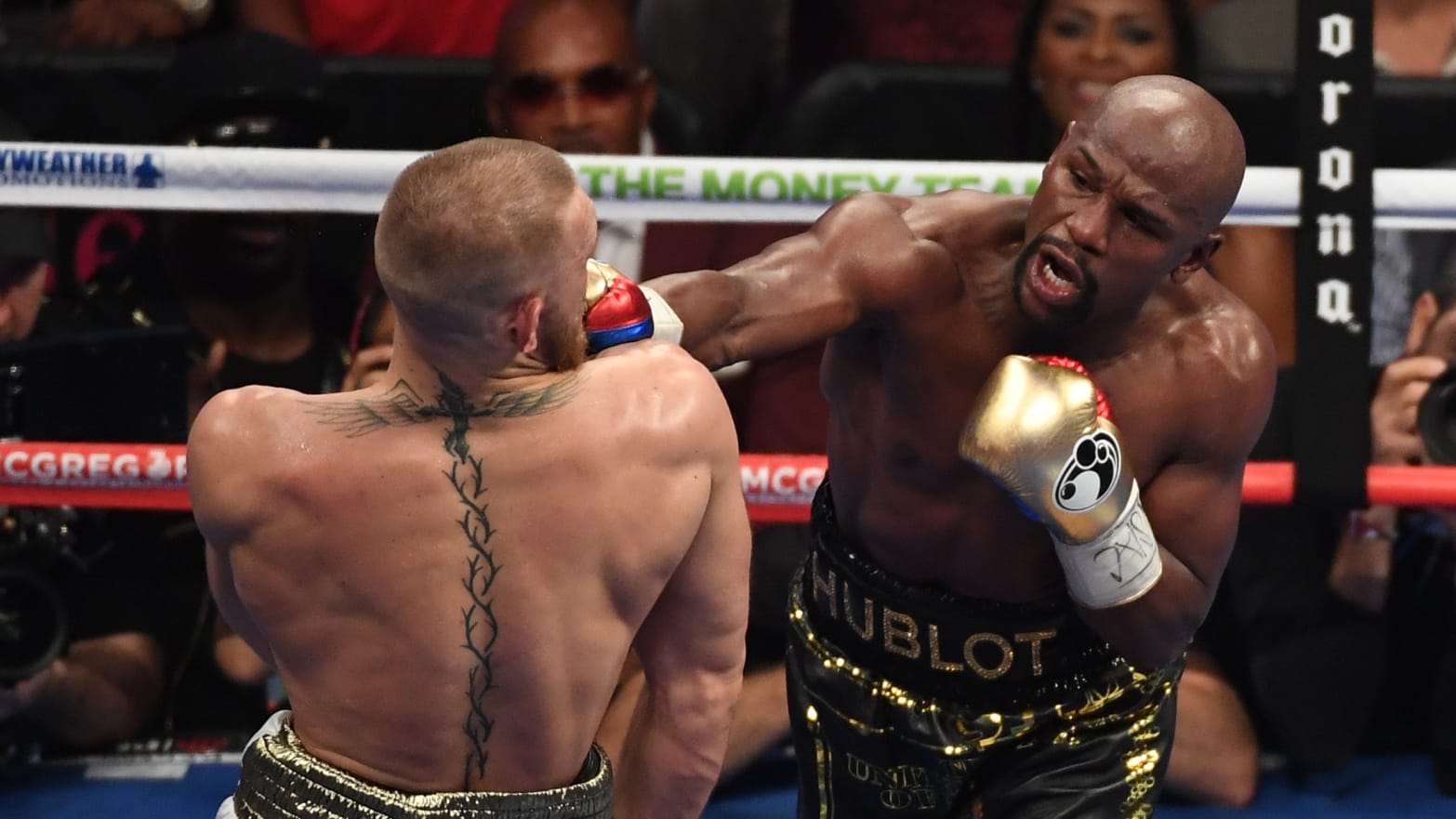Early Sunday morning, the undefeated boxer Floyd Mayweather defeated mixed martial artist Conor McGregor at the T-Mobile Arena in Las Vegas, Nevada, by a technical knockout after the referee stopped the fight in the 10th round, when Mayweather was relentlessly pummeling an exhausted, bloodied, and defenseless McGregor.
It made for a surprisingly entertaining fight—much to my surprise—if a lousy boxing match. Credit McGregor, who did far better than anyone could have imagined, though his utter lack of experience made for a pretty lowly bar to hurdle. For the first few rounds, Mayweather, as is his wont, barely threw a punch, ostensibly sizing up his opponent, while McGregor was able to land a series of power-free if effective jabs, and using deft footwork, landing one solid left uppercut.
Starting in the fourth round, Mayweather began to take over, though McGregor couldn’t stop himself from reverting to his MMA roots, perhaps due to muscle memory as opposed to anything else. He repeatedly threw illegal hammer fists to the back of Mayweather’s head, a practice referee Robert Byrd oddly didn’t seem inclined to put an end to.
Mayweather was forced to be far more aggressive than normal, but as the announcers repeatedly noted, after a 23-month absence his speed just wasn’t there, and the shift in styles only exacerbated his problems. For McGregor, despite his early success, exhaustion began to set in during the final four rounds, and while he’d been scoring considerable points and keeping the unofficial scorecard practically knotted, down 86-85 entering the 10th, his legs were gone and Mayweather began raining down blows, bloodying McGregor—who could barely raise his arms to protect himself, let alone stay on his feet. It was the first knockout scored by Mayweather since 2011.
This, according to Mayweather, was by design. “Our game plan was to take our time,” he said after the fight. “We wanted him to shoot his heavy shots at the beginning. I guaranteed everyone this fight wouldn’t go the distance.”
McGregor said of Mayweather’s change in style, “He fought like a Mexican.” It was reportedly intended as a compliment, but given McGregor’s history of outright racist statements, it’s understandable if you don’t want to give him the benefit of the doubt.
Despite the entertainment value of the actual fight, Showtime still felt compelled to oversell the product. At 9pm they kicked off the proceedings by airing a hype reel which linked Frank Sinatra, Elvis Presley, the atomic bomb, Evel Knievel, and all the prominent, non-ridiculous boxing matches in Las Vegas’s history, positing all of them as a mere prologue to Mayweather-McGregor. The announcers reminded those tuning in that the bout has been dubbed, “The Money Fight,” which is true, though in ways the promoters did not intend, while sanding down every rough edge imaginable by describing Mayweather’s history of domestic violence as “controversy outside the ring” and adding that McGregor has a “polarizing personality.”
Prior to a pre-fight interview with McGregor, Showtime used a quote from Muhammad Ali, “He who is not courageous enough to take risks will accomplish nothing in life,” as part of a voiceover, intoned with great seriousness and gravitas by Jim Gray.
Regardless, attention was paid. The rank bigotry—and cynical ploy to appeal to our worst instincts—worked, resulting in nonstop media coverage. The great hulking and wholly unsubtle Las Vegas promotional machine did what it always does, and the fighters themselves, including Mayweather’s hints that McGregor posed a serious threat, while simultaneously telling everyone who’d listen that he’d been having a grand old time on the Las Vegas strip of late, and McGregor’s very on-brand boasts that he’ll shock the world (while encouraging people to bet on him), kept eyes glued to various screens.
Celebrities showed up to walk the red carpet, and though we won’t know the final totals for a while, odds are, it’ll attract close to 4.9 million pairs of eyeballs, topping the 4.4 million viewers for the Mayweather-Pacquiao “Fight of the Century” in 2015, which banked about $400 million in the United States alone. Given that the sheer amount of viewers caused Showtime’s and the UFC’s online (legal) livestreams to repeatedly crash, causing the main event to be pushed back, the numbers might be eye-popping.
And the sportsbooks have to be thrilled, considering that a massive upset would have cost them untold millions. According to ESPN’s David Purdum, the Nevada sportsbooks alone collected over $80 million in wagers, once again besting Mayweather-Pacquiao for the highest-ever total. And that’s not counting the bets made abroad. Paddy Power, one of Ireland’s largest sports books, expects to reel in $250 million.
Naturally, Mayweather, an inveterate and profligate gambler, claimed that he was going to bet on himself, a practice that is allowed by both the Nevada Athletic Commission and the Nevada Gaming Control Board, and that the bet would be so massive it would be hard to miss.
“You guys will see the betting ticket, don’t worry,” Mayweather said, according to the Los Angeles Times. Mayweather also promised that, as he had for previous heavy wagers, the image would pop up on social media. Sources told Purdum, though, that he was thwarted in an attempt to place a $400,000 bet that he’d finish McGregor before the 10th round.
Leading up to the fight, a reported 95 percent of the total bets had been placed on McGregor, but that should not be taken as an indication that the fix was in, Purdum explained. Rather, it came as a result of the MMA devotees who craved validation of their entire sport and McGregor’s backers in his native Ireland who were dropping small bets in the hopes of snagging a big win. (At one online sportsbook in the United Kingdom, 72 percent of the total dollars wagered were on Mayweather.)
“It’s more the size of the public interest in McGregor based on the deep embedding of gambling in Irish sports culture and the general lack of a barrier to entry for fan interest in the fight, good old-fashioned racism, and the lack of a barrier to entry for interest in the fight,” Patrick Wyman, who writes about combat sports for Deadspin and the Washington Post, explained.
“It’s mark money coming in from small bettors in enormous quantities, and books have to shift the lines to minimize their liabilities.”
Purdum added that while it was “unusual” to see such an extreme preference for one fighter, it shouldn’t lend any credence to the idea that the fight was rigged, even if golfer Rory McIlroy said just that. “This would be like trying to fix the Super Bowl,” he said.
Asked for a prediction earlier this week, Wyman was able to nail the broad outlines of the fight, even if he missed some of the details—such as McGregor’s ability to use the clinch to his advantage. “McGregor roughs him up early with pressure and clinch work, then Mayweather takes over in the middle rounds,” he said. “It gets ugly late as McGregor fades and Mayweather takes an increasingly wide decision.”
After the fight was over, Mayweather said he was retiring for good, exiting with his perfect 50-0 record intact, and putting to rest any whispers about a rematch with McGregor. Then again, that’s what Mayweather said back in 2015 and 2013 and 2008. Given that the total revenue is expected to top half a billion dollars, it’s hard to take him at his word.
After all, no matter how ugly things got in the weeks leading up to the fight, people watched and another nine-figure payday is just sitting there. Whether a kind of odd and jarring spectacle was worth all the awfulness that preceded it won’t ever be considered by those tabulating the receipts. For the UFC, Showtime, Mayweather, McGregor and certainly for Las Vegas, the money is all that ever mattered.

